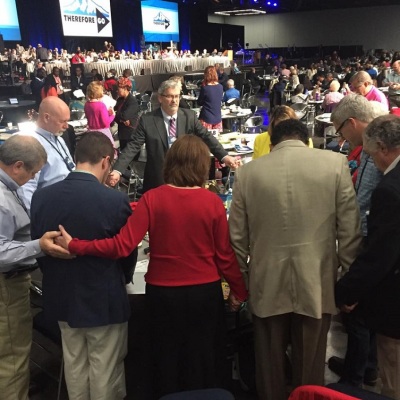No Gay Ordination, United Methodists Decide for Now

The United Methodist Church will put a moratorium on its homosexuality debate, delaying at least for the time being efforts to allow for the ordination of non-celibate clergy.
Delegates at the UMC General Conference in Portland, Oregon, voted 428-405 Wednesday evening to adopt a proposal from the Council of Bishops halting Church legislation on human sexuality issues.
Titled "An Offering for a Way Forward," the Council of Bishops' recommendation will involve church leadership appointing a "special commission" to analyze the denomination's official stance on homosexuality, gay marriage, and gay ordination.

"We recommend that the General Conference defer all votes on human sexuality and refer this entire subject to a special commission, named by the Council of Bishops, to develop a complete examination and possible revision of every paragraph in our Book of Discipline regarding human sexuality," reads the recommendation.
"We will name such a commission to include persons from every region of our UMC, and will include representation from differing perspectives on the debate. We commit to maintain an on-going dialogue with this commission as they do their work, including clear objectives and outcomes."
The recommendation does not involve a finalized plan, with it noting that a special General Conference might be called as early as 2018, as opposed to the planned 2020 General Conference.
"We have discussed in depth the processes which might help our Church heal and move forward — up to and including the possibility of a called General Conference in 2018 or 2019," continued the recommendation.
"We have not finalized our plans for such processes, but we will keep working on options we have heard from many of you, and we will keep reporting to this General Conference and to the whole Church."
According to the United Methodist Church's Book of Discipline, homosexuality is "incompatible with Christian teaching" and no clergy can be ordained who is involved in a same-sex relationship.
As American secular society has become more accepting of homosexuality, some UMC congregations and leaders have called on the Church to change its positions on gay ordination, the definition of marriage, and removing the "incompatible" language from the Book of Discipline.
In advance of the 2016 General Conference, a few regional bodies of the UMC announced they would refuse to consider the sexual orientation of clergy candidates.
"Sexual orientation and gender identity are not and will not be considered in the evaluation of candidates by the Board of Ordained Ministry," reads a statement from the New York Annual Conference's Board of Ordained Ministry.
"As a whole, the BOOM has observed vital, effective ministry from clergy married to a spouse of the same sex. Quite simply, discriminating against married persons regardless of the gender of their spouse or against those who hope to be married is not the path we believe God is calling us to walk."
Past efforts to change the denomination's position on homosexuality, including at the 2012 General Conference, have failed when brought to a vote by the delegates.
A major factor for these defeats have been the growing African delegation at General Conference, which tends to support conservative theological viewpoints.
Last September, the Africa College of Bishops released a statement denouncing efforts to change the UMC's position on homosexuality.
"We are deeply saddened that the Holy Bible, our primary authority for faith and the practice of Christian living, and our Book of Discipline are being grossly ignored by some members and leaders of our Church in favor of social and cultural practices that have no scriptural basis for acceptance in Christian worship and conduct," stated the African bishops.
"The Christian marriage covenant is holy, sacred, and consecrated by God and is expressed in shared fidelity between one man and one woman for life. In this vein, we denounce all forms of sexual exploitation, including fornication, adultery, sexual commercialization, slavery, abuse, polygamy, etc."
Reconciling Ministries Network Executive Director Matt Berryman said in a statement that he believed the Council of Bishops' recommendation was a step forward for LGBT equality.
"This historic action by the Council of Bishops (COB) represents a significant institutional shift in the direction of inclusion and equality," stated Berryman.
"It is just a beginning, but it signals hope to an end of church trials, to celebrating all marriages, to accepting the gifts of our LGBTQ candidates for ministry, clergy and lay employees."
While some conservatives have expressed concern over the implementation of the recommendation, Institute on Religion & Democracy President Mark Tooley noted the upside of the end of debate over human sexuality issues for this year's General Conference.
"But at least one more General Conference has averted the official liberalization on sex that has precipitated schism in other Mainline Protestant denominations," wrote Tooley.
"The overseas church can continue to grow while the USA Church continues its half century of steady decline without the accelerating implosion suffered by the Episcopal, Presbyterian and United Church of Christ denominations."






















